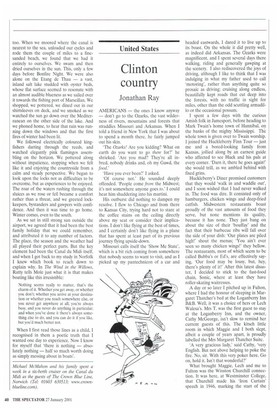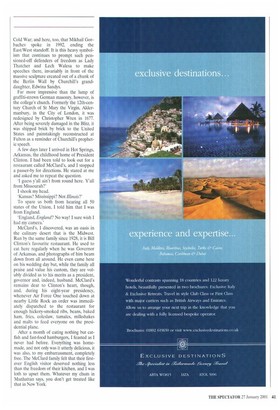Clinton country
Jonathan Ray
AMERICANS — the ones I know anyway — don't go to the Ozarks, the vast wilderness of rivers, mountains and forests that straddles Missouri and Arkansas. When I told a friend in New York that I was about to spend a month there, he fairly jumped out his skin.
'The Ozarks! Are you kidding? What on earth do you want to go there for?' he shrieked. 'Are you mad? They're all inbred, nobody drinks and, oh my Gawd, the food.'
'Have you ever been?' I asked.
'Of course not.' He sounded deeply offended. 'People come from the Midwest; it's not somewhere anyone goes to.' I could hear him shuddering into his martini.
His outburst did nothing to dampen my resolve. I flew to Chicago and from there to Kansas City, trying hard not to stare at the coffee stains on the ceiling directly above my seat or consider their implications. I don't like flying at the best of times, and I certainly don't like flying in a plane that has spent at least part of its previous journey flying upside-down.
Missouri calls itself the 'Show Me State', which is a bit rich coming from somewhere that nobody seems to want to visit, and as I picked up my pantechnicon of a car and headed eastwards, I dared it to live up to its boast. On the whole it did pretty well, as indeed did Arkansas. The Ozarks were magnificent, and I spent several days there walking, riding and generally gawping at the scenery. I also rediscovered the joys of driving, although I like to think that I was indulging in what my father used to call 'motoring', rather than anything quite so prosaic as driving; cruising along endless, beautifully kept roads that cut deep into the forests, with no traffic in sight for miles, other than the odd scuttling armadillo or the occasional possum.
I spent a few days with the curious Amish folk in Jamesport, before heading to Mark Twain's home town of Hannibal, on the banks of the mighty Mississippi. The whole town is given over to Twain worship. I joined the Huckleberry Finn Tour — just me and a bored-looking family from Kansas, jollied along by an earnest guide who affected to see Huck and his pals at every corner. 'Darn it, there he goes again!' she would trill, as we ambled behind with fixed grins.
Huckleberry's Diner promised customers that they would 'walk in and waddle out', and I soon wished that I had never walked in. The food was dire. It consisted only of hamburgers, chicken wings and deep-fried catfish. Midwestern restaurants boast proudly of the vast amounts of food they serve, but none mentions its quality, because it has none. They just bang on about the size of their touffay' and the fact that their barbecue ribs will fall over the side of your dish: 'Our plates are piled high!' shout the menus; 'You ain't ever seen so many chicken wings!' they bellow. The restaurants, most of which seem to be called Bubba's or Ed's, are effectively saying, 'Our food may be lousy, but, hey, there's plenty of it!' After this latest disaster, I decided to stick to the fast-food chain, Sonic, where at least they have roller-skating waitresses.
A day or so later I pitched up in Fulton, where I had the honour of sleeping in Margaret Thatcher's bed at the Loganberry Inn B&B. Well, it was a choice of hers or Lech Walesa's. Mrs T. was the first guest to stay at the Loganberry Inn, and the owner, Cathy McGeorge, isn't slow to remind her current guests of this. The kitsch little room in which Maggie and I both slept, albeit a couple of years apart, is proudly labelled the Mrs Margaret Thatcher Suite.
'A very gracious lady,' said Cathy, 'very English. But not above helping to poke the fire. No, sir. With this very poker here. Go on, hold it. Isn't that wonderful?'
What brought Maggie, Lech and me to Fulton was the Winston Churchill connection. It was here, at Westminster College, that Churchill made his 'Iron Curtain' speech in 1946, marking the start of the Cold War; and here, too, that Mikhail Gorbachev spoke in 1992, ending the East/West standoff. It is this heavy symbolism that continues to prompt such pensioned-off defenders of freedom as Lady Thatcher and Lech Walesa to make speeches there, invariably in front of the massive sculpture created out of a chunk of the Berlin Wall by Churchill's granddaughter, Edwina Sandys.
Far more impressive than the lump of graffiti-strewn German masonry, however, is the college's church. Formerly the 12th-century Church of St Mary the Virgin, Aldermanbury, in the City of London, it was redesigned by Christopher Wren in 1677. After being severely damaged in the Blitz, it was shipped brick by brick to the United States and painstakingly reconstructed at Fulton as a reminder of Churchill's prophetic speech.
A few days later I arrived in Hot Springs, Arkansas, the childhood home of President Clinton. I had been told to look out for a restaurant called McClard's, and I stopped a passer-by for directions. He stared at me and asked me to repeat the question.
'I guess y'all ain't from round here. Y'all from Missourah?'
I shook my head.
'Kansas? Mississippi? Not Illinois?'
To spare us both from hearing all 50 states of the Union, I told him that I was from England.
'England, England? No way! I sure wish I had my camera.'
McClard's, I discovered, was an oasis in the culinary desert that is the Midwest. Run by the same family since 1928, it is Bill Clinton's favourite restaurant. He used to eat here regularly when he was Governor of Arkansas, and photographs of him beam down from all around. He even came here on his wedding day but, while the family all praise and value his custom, they are volubly divided as to his merits as a president, governor and, indeed, husband. McClard's remains dear to Clinton's heart, though, and, during his eight-year presidency, whenever Air Force One touched down at nearby Little Rock an order was immediately dispatched to the restaurant for enough hickory-smoked ribs, beans, baked ham, fries, coleslaw, tamales, milkshakes and malts to feed everyone on the presidential plane.
After a month of eating nothing but catfish and fast-food hamburgers, I feasted as I never had before. Everything was homemade, and not only was it utterly delicious, it was also, to my embarrassment, completely free. The McClard family felt that their firstever English visitor deserved nothing less than the freedom of their kitchen, and I was loth to upset them. Whatever my chum in Manhattan says, you don't get treated like that in New York.























































































 Previous page
Previous page